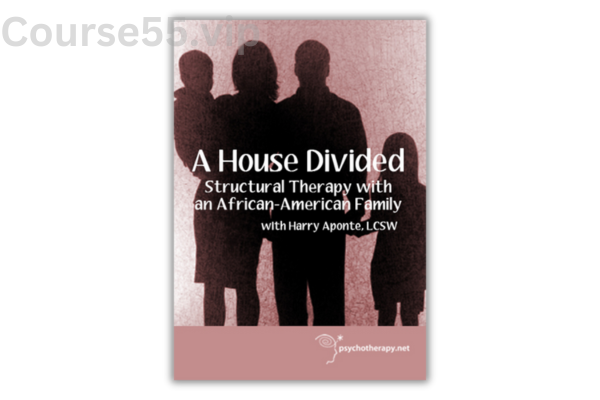A House Divided – Structural Therapy with a Black Family With Harry Aponte
$39.00 Original price was: $39.00.$7.70Current price is: $7.70.
A house divided: Structural therapy with a black family – Digital Download!

A House Divided – Structural Therapy with a Black Family With Harry Aponte
Overview

Exploring Family Therapy in Action: A Deep Dive into a Black Family’s Dynamics
Family dynamics can often offer a mix of challenges and pathways for personal and collective growth. In “A House Divided: Structural Therapy with a Black Family,” Harry Aponte delves into these complexities, offering a detailed look at how structural family therapy can be applied in a real-world scenario. The video focuses on a family dealing with the impact of their ten-year-old son’s theft, and it presents both the personal and societal challenges that arise in situations of alienation, legal issues, and step-family interactions. Aponte’s expert guidance provides a therapeutic framework that encourages understanding, healing, and communication, making this an insightful resource not just for the family involved but also for students and professionals in fields like psychology, social work, and counseling.
Understanding Structural Family Therapy: A Path to Insight and Healing
Core Concepts of Structural Family Therapy
Structural family therapy emphasizes the importance of viewing a family as an interconnected system, where each individual plays a role in the overall structure. Created by Salvador Minuchin, this approach focuses on identifying both visible and hidden rules that influence family behavior. These rules dictate everything from how family members communicate to the unspoken boundaries that govern interactions.
In the case presented in Aponte’s session, the child’s theft isn’t merely an isolated problem; it’s a manifestation of deeper issues within the family. The session helps reveal how these behavioral patterns often stem from unaddressed structural dysfunctions, and Aponte’s methods aim to highlight and address these core issues.
Aponte’s Key Techniques in Structural Family Therapy
Harry Aponte employs several essential techniques that align with the principles of structural family therapy. These techniques include:
-
Building Connection (Joining): Aponte begins by establishing a strong rapport with the family, creating a safe and open space for dialogue. This step is essential in allowing each member to voice their feelings and concerns without judgment.
-
Shifting Perspectives (Reframing): Rather than seeing the son’s theft purely as a negative behavior, Aponte encourages the family to view it as a sign of underlying distress that needs attention.
-
Experiential Roleplay (Enactments): Aponte uses role-playing to help family members witness their own interactions from a fresh perspective. This technique helps identify recurring patterns of behavior that may not be immediately apparent.
-
Clarifying Boundaries (Boundary Setting): Establishing clear boundaries within the family’s roles is crucial in restoring balance. By helping the parents understand their role in the child’s actions, Aponte facilitates a shift toward healthier relational dynamics.
Through these strategies, Aponte leads the family to recognize both their strengths and the ways they contribute to their struggles, fostering an environment of openness and potential for healing.
Family Dynamics Unpacked: Understanding the Influences and Struggles
Uncovering the Deeper Issues Within the Family
Several critical factors emerge when analyzing the family’s situation in the video:
-
Feelings of Alienation: Communication breakdowns often lead to alienation, where each family member feels isolated in their experiences. This sense of disconnect is evident throughout the session.
-
Complications from Legal Issues: The child’s actions and their legal ramifications add another layer of tension, amplifying fear, resentment, and anxiety within the family.
-
Challenges in Blended Families: The complexities of step-family dynamics are explored in the session. Aponte’s intervention sheds light on how previous relationships and expectations influence current family interactions, sometimes causing friction or misunderstanding.
The Emotional Underpinnings of Family Struggles
In structural family therapy, it is essential to address the emotional dimensions that contribute to family issues. Often, problematic behavior, such as the child’s theft, can be traced back to unmet emotional needs within the home. Aponte’s approach uncovers these emotional roots, allowing the family to gain insight into their struggles.
A helpful metaphor for understanding these dynamics is comparing family relationships to the roots of a tree: unseen but critical, these emotional underpinnings either nourish or hinder the family’s growth. Just as roots need attention to ensure a tree’s health, so do the emotional connections within a family.
Evaluating Aponte’s Method: Effectiveness and Limitations
Key Strengths of Aponte’s Approach
Aponte’s therapeutic style has several notable strengths:
-
Approachability: His techniques are easy to understand and accessible, even for those who may be new to therapy. This creates an environment where family members can feel comfortable expressing themselves.
-
Immediate Applicability: Aponte focuses on real-life family interactions, offering strategies that can be quickly integrated into daily routines, thus providing practical, immediate solutions.
-
Learning Opportunity for Professionals: The video serves as a teaching tool, offering valuable insights for students and professionals. It demonstrates the real-time application of therapeutic principles, making complex concepts more digestible.
Potential Critiques and Areas for Improvement
While Aponte’s approach is largely effective, there are some areas where critiques can arise:
-
Cultural Sensitivity: The dynamics explored in this session may not universally apply to all families, especially given cultural differences. Structural family therapy may require adaptation to resonate with diverse family experiences and backgrounds.
-
Need for Ongoing Therapy: Although the session provides valuable insights, it is important to note that a single session may not fully address the underlying issues. Long-term engagement is often necessary to achieve lasting transformation, which may not be fully captured in this video format.
Concluding Thoughts: Lessons from Aponte’s Work with a Black Family
In “A House Divided: Structural Therapy with a Black Family,” Harry Aponte skillfully navigates the complexities of family relationships, demonstrating how structural family therapy can lead to significant healing. Through techniques like joining, reframing, and boundary setting, Aponte not only fosters trust but also equips families with the tools needed to overcome relational challenges. This video is a vital resource for those seeking peace within their families and for professionals who wish to deepen their understanding of family dynamics. It serves as a testament to the power of therapy and the enduring potential for unity within even the most fragmented families. Through Aponte’s insights, we are reminded that every family, no matter how divided, has the potential for growth and understanding.
Frequently Asked Questions:
Business Model Innovation: We operate a group buying strategy, allowing participants to share costs and access popular courses at reduced prices. This model benefits individuals with limited financial resources, despite concerns from content creators about distribution methods.
Legal Considerations: The legality of our operations involves complex issues. Although we don’t have explicit permission from course creators to resell their content, there are no specific resale restrictions stated at the time of purchase. This ambiguity creates an opportunity for us to provide affordable educational resources.
Quality Control: We ensure that all course materials purchased are identical to those offered directly by the creators. However, it’s important to understand that we are not official providers. As such, our offerings do not include:
– Live coaching calls or sessions with the course author.
– Access to exclusive author-controlled groups or portals.
– Membership in private forums.
– Direct email support from the author or their team.
We aim to reduce the cost barrier in education by offering these courses independently, without the premium services available through official channels. We appreciate your understanding of our unique approach.
Be the first to review “A House Divided – Structural Therapy with a Black Family With Harry Aponte” Cancel reply
You must be logged in to post a review.

 New Rules for Treating Trauma: Integrating Neuroscience for Resilience, Connection and Post-Traumatic Growth By Courtney Armstrong - PESI
New Rules for Treating Trauma: Integrating Neuroscience for Resilience, Connection and Post-Traumatic Growth By Courtney Armstrong - PESI 















Reviews
There are no reviews yet.